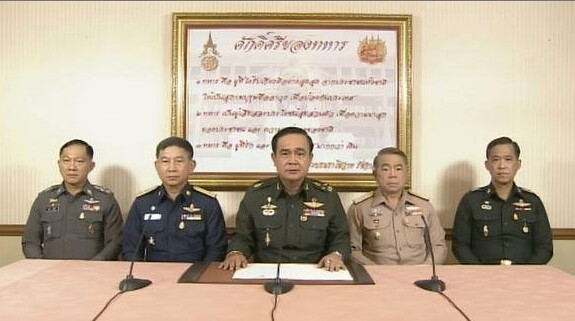May 2015 is a significant month for Thailand, but perhaps not for the right reasons. On May 19, it is exactly five years since the Thai military, at the order of the then government of Prime Minister Abhisit Vejjajiva, launched brutal crackdowns against the red-shirt protesters, who demanded him return power to the Thai voters and called for a fresh election. Abhisit was accused of taking power illegitimately; he was only able to form a minority government with the backing of the army. The crackdowns resulted in 99 protesters being killed and over 2,000 injured.
Five years have passed, nobody has been charged of killings the demonstrators. The culture of impunity has deeply rooted in Thai society. Shockingly, those who were responsible for the deadly crackdowns against the people five years ago are now holding political power. Last year, on May 22, the military staged a coup that overthrew the elected government of Prime Minister Yingluck Shinawatra. After months of anti-Yingluck protests, the military intervened in politics supposedly to prevent Thailand from slipping into a new round of political violence.

On 22 May 2015: The Thai coup, one year on.
But in reality, the military has striven to take control over the upcoming royal succession—an event that has brought out many uncertainties. On this basis, the claim of the military to work toward promoting greater democratization in Thailand and push for political reforms has somewhat been bogus. It is evident that the current constitutional drafting committees are assigned to ensure that the military and its supporters will be able to control the electoral system. Thus, while the election may take place next year, the result may not reflect what the majority of voters want.
Through this process, the military is sponsoring the drafting of the constitution, designed to empower extra-parliamentary institutions, such as the Senate and independent organizations, over future elected governments. The junta-endorsed constitution will stipulate that future prime ministers need not be elected, thus paving the way for “an outsider” handpicked by the military. So, the coup leader and current self-appointed Prime Minister General Prayuth Chan-ocha could return to the premiership after the election. Furthermore, future members of parliaments can be independent candidates, purportedly to break up the domination of politics by powerful political parties, like that of Thaksin. A weak and loose coalition government may emerge after next year’s election.
From this view, the upcoming election will not solve the political crisis. Indeed, it will drag Thailand back into the vicious circle in which the traditional elites have continued to belittle the voice of the majority of the electoral voters. The military has announced that there would be no referendum over the constitution. It is therefore anticipated that in the post-election period, a wave of protests against the new political structure could hit the streets of Bangkok again.
At the same time, Thai society is functioning under a climate of fear. While the Martial Law was abolished, it has been replaced by Article 44, which gives sweeping power to the military. As a consequence, most Thais are still not allowed to express their political views particularly those different from the military rule. Civilians are taken to Martial Court. Basic human rights of the people have been violated.
Amid this situation, Thailand’s Human Rights Commission continues to be politicized. It has refused to address this serious issue of human rights abuses. The ignorance on the part of this not-so-independent organization has led to the increasing confidence on the part of the military regime to further suppress the society. Together with this, the rise of lese-majeste cases has proven the state of human rights crisis in Thailand.
Red-shirt members, having been unable to forget what happened to their loved one at Ratchaprasong in 2010, have today been harassed by the state authorities. It has been reported that troops were sent to remote parts of Thailand—in the north and northeast—in order to breaking up the so-called red-shirt network. They have been perceived as enemies of the state. The fact that they have long supported the Shanawatra family has added up a sense of suspicion in the eyes of the military government.
It is thus unfortunate for Thailand, in particular, the ongoing democratic movements of which some red shirts have become a part, to have to go through the suppression by the state. It will take years for the red0shirt movement to come back. This will surely affect the democratic trajectory of Thailand.
But the impact is not limited within the Thai border. The political uncertainty will throw Thailand in jeopardy and cause an impact on the region. For many years, Thailand’s economic success allowed the country to play a major role in Southeast Asia, as a hub of key businesses inexorably integrated with the global supply chains. But the political instability, at least since 2006 coup, has intensified foreign investors’ wariness. Some Japanese conglomerated have relocated parts of their investments in Thailand to other locations in the region, such as to Indonesia and Vietnam. The current coup-makers have desperately striven to bring back confidence of foreign investors in the Thai economy as well as to seek their endorsement of the military regime. Economic stability serves as a key factor behind the Thai junta’s survival.
The international game of politics presents itself as an obstacle and an advantage to the military government. Using its intimate relations with neighboring countries, such as those in ASEAN and China, to counter the sanctions from Western governments, the junta has successfully diversified its foreign policy options. The provision of legitimacy to the Thai junta by Thailand’s neighbors, in this case, may help prolong the life of the military rule regime, which will not contribute positively to the Thai political situation in the long run.
 Pavin Chachavalpongpun is associate professor at Kyoto University’s Center for Southeast Asian Studies.
Pavin Chachavalpongpun is associate professor at Kyoto University’s Center for Southeast Asian Studies.
Prachatai English is an independent, non-profit news outlet committed to covering underreported issues in Thailand, especially about democratization and human rights, despite pressure from the authorities. Your support will ensure that we stay a professional media source and be able to meet the challenges and deliver in-depth reporting.
• Simple steps to support Prachatai English
1. Bank transfer to account “โครงการหนังสือพิมพ์อินเทอร์เน็ต ประชาไท” or “Prachatai Online Newspaper” 091-0-21689-4, Krungthai Bank
2. Or, Transfer money via Paypal, to e-mail address: [email protected], please leave a comment on the transaction as “For Prachatai English”
